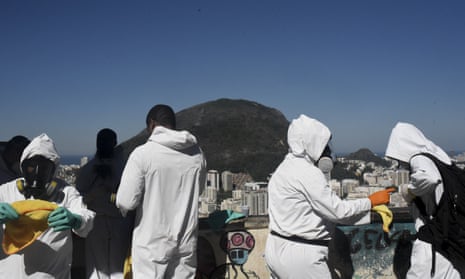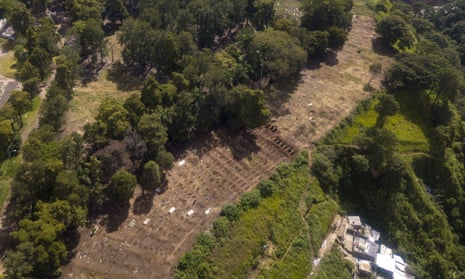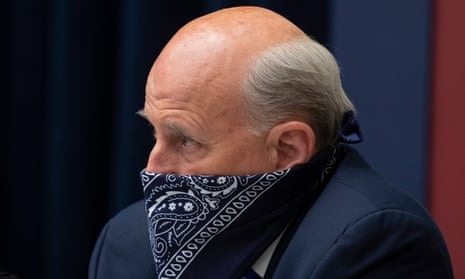We’ve launched a new blog at the link below – head there for the latest:
France sees highest daily increase in cases for over a month – as it happened
American deaths pass grim milestone; French authorities report 1,392 new cases; Hong Kong outbreak ‘overwhelming’ medical system. This blog is now closed
Wed 29 Jul 2020 19.20 EDT
First published on Tue 28 Jul 2020 19.13 EDT- Summary
- Brazil confirms nearly 70,000 coronavirus cases in new national daily record
- Summary
- US coronavirus deaths top 150,000
- France sees highest daily increase in cases in more than a month
- Summary
- Madrid officials row back after outrage over plans for 'immunity cards'
- Summary
- Hong Kong elections could be delayed
- UK government signs vaccine deal
- Summary
- Hong Kong outbreak 'overwhelming' medical system says Carrie Lam
- Global report: downsized hajj pilgrimage begins amid Covid-19 restrictions
- Strictest measures in Hong Kong so far begin
- New Zealand reports two coronavirus cases, both in travellers in quarantine
- Active cases in the Victorian aged care sector top 800
- Victoria records 295 new cases of coronavirus and nine more deaths
- China reports 101 cases, highest since mid-April
- New Zealand to start charging some travellers for hotel quarantine
- Australia facing “sustained community transmission" says Prime Minister
- Pilgrims quarantined in Mecca as Hajj begins
- Air New Zealand freezes ticket bookings to Australia until 28 August
- Florida reports record one-day deaths as concerns grow for other states
- Trump storms out of press conference
- Trump blames US case surge on protestors
- Summary

Live feed
- Summary
- Brazil confirms nearly 70,000 coronavirus cases in new national daily record
- Summary
- US coronavirus deaths top 150,000
- France sees highest daily increase in cases in more than a month
- Summary
- Madrid officials row back after outrage over plans for 'immunity cards'
- Summary
- Hong Kong elections could be delayed
- UK government signs vaccine deal
- Summary
- Hong Kong outbreak 'overwhelming' medical system says Carrie Lam
- Global report: downsized hajj pilgrimage begins amid Covid-19 restrictions
- Strictest measures in Hong Kong so far begin
- New Zealand reports two coronavirus cases, both in travellers in quarantine
- Active cases in the Victorian aged care sector top 800
- Victoria records 295 new cases of coronavirus and nine more deaths
- China reports 101 cases, highest since mid-April
- New Zealand to start charging some travellers for hotel quarantine
- Australia facing “sustained community transmission" says Prime Minister
- Pilgrims quarantined in Mecca as Hajj begins
- Air New Zealand freezes ticket bookings to Australia until 28 August
- Florida reports record one-day deaths as concerns grow for other states
- Trump storms out of press conference
- Trump blames US case surge on protestors
- Summary

The scandal over Dominic Cummings’ trips to and around Durham during lockdown damaged trust and was a key factor in the breakdown of a sense of national unity amid the coronavirus pandemic, research suggests.
Revelations that Cummings and his family travelled to his parents’ farm despite ministers repeatedly imploring the public to stay at home – as exposed by the Guardian and the Daily Mirror in May - also crystallised distrust in politicians over the crisis, according to a report from the thinktank British Future.
The findings emerged in a series of surveys, diaries and interviews carried out over the first months of the pandemic as the public got to grips with profound changes to their habits, relationships and lifestyles:
Hi, Helen Sullivan joining you now.
I’ll be bringing you the latest for the next few hours – get in touch on Twitter @helenrsullivan or via email: helen.sullivan@theguardian.com.
Summary
Here’s a quick recap of the latest developments from the past few hours:
- US coronavirus deaths passed 150,000. The death toll is higher than in any other country and is nearly a quarter of the world’s total. Of the 20 countries with the biggest outbreaks, the United States ranks sixth in deaths per capita, at 4.5 fatalities per 10,000 people, according to a Reuters tally.
- Brazil confirmed nearly 70,000 coronavirus cases in new daily record. The country recorded 69,074 new confirmed cases and 1,595 related deaths, as the world’s second-worst outbreak accelerates toward the milestone of 100,000 lives cut short.
- Guatemala is burying dozens of unidentified Covid-19 dead. Hospitals say they have had to bury dozens of Covid-19 victims who have never been identified, with one hospital creating archives in hopes that once the pandemic passes relatives will come looking for them.
- Macron’s popularity shot up after an EU recovery deal. In an opinion poll half of respondents said they were confident in the president’s policies for France, only the second time since April 2018 he has reached the 50% mark.
- France saw its highest daily increase in cases in more than a month. The number of new coronavirus infections in France rose by 1,392 on Wednesday, a figure likely to fuel fears of a second wave despite officials downplaying such a scenario.
- The Catalan government eased lockdown in city of Lleida. 160,000 people had been ordered to stay home following a spike in infections.
- Lebanon reported its highest single-day infection tally. The country reporter 182 new coronavirus cases, ahead of fresh lockdown measures that go into effect at midnight.
Argentina has started clinical trials on treating Covid-19 using hyperimmune serum developed with antibodies from horses, authorities from the laboratory involved said.
The serum, produced by biotechnology company Inmunova, is obtained by injecting a SARS-CoV-2 protein, which causes the animal to generate a large amount of neutralizing antibodies.
Plasma is then extracted from the horse, purified and processed.
After positive results in laboratory tests, the clinical trial to study the effectiveness of the serum will be carried out on 242 people diagnosed with the disease in moderate to severe conditions, the laboratory said.
“If we can lower viral replication in the first days, not only are we going to lower the viral load of the disease and the referral of patients... but we think this neutralizing capacity will allow patients to develop their own immune response,” said Fernando Goldbaum, Inmunova’s scientific director.
Goldbaum said trials had started on Monday and the first results were expected between October and November.
Argentina has registered close to 175,000 confirmed cases of Covid-19, with around 3,200 fatalities.
Guatemalan hospitals say they have had to bury dozens of Covid-19 victims who have never been identified, and one hospital is creating archives in hopes that once the pandemic passes, their relatives will come looking for them.
Workers at one of the country’s largest public hospitals have started photographing patients who arrive alone and too ill to give their personal details.
Those who die unidentified are placed in body bags with transparent windows over the faces in case relatives do arrive.
Protocols that call for rapidly burying the dead during a pandemic only make the situation more difficult, officials say.
The government has reported more than 47,000 confirmed infections and more 1,800 deaths nationwide.
The first of 63 unidentified dead at the San Juan de Dios Hospital, one of the capital’s largest, died on 25 April. She was in her 20s and was buried the same day.

Byron Fuentes, director of the health ministry’s Public Cemetery Administration, said that so far no one has come forward seeking any of the 41 men and 22 women they have buried, identified only as XX.
One death certificate viewed by The Associated Press showed the person identified only as XX XX, XX XX, with the gender and an estimated age. For cause of death it listed acute respiratory distress syndrome and Covid-19.
For now, the unidentified Covid-19 victims are buried in a designated area deep in the capital’s Verbena Cemetery.
Surrounded by trees and near a settlement of improvised housing, unadorned graves are simply marked with a number.

For relatives who may one day seek out their loved ones, there is little to go on.
Officials estimate an age, record the gender and the hospital where they arrived. Relatives would have to provide information to match those limited details, said Fuentes, the cemeteries chief. Even then confirmation would be complicated.
“The law establishes that when someone dies from a quarantined illness, they can’t be exhumed,” he said. “The same law gives us an exception, but it is on a judges order, the judge would be the one responsible.”
“Since we stated to bury, we have not received any requests from anyone looking for a relative,” Fuentes said.
Brazil confirms nearly 70,000 coronavirus cases in new national daily record
Brazil’s coronavirus outbreak set daily records on Wednesday with both 69,074 new confirmed cases and 1,595 related deaths, as the world’s second-worst outbreak accelerates toward the milestone of 100,000 lives cut short.
Brazil is the country worst hit by Covid-19 outside of the United States in both death toll and case count, with more than 2.5 million confirmed cases and 90,134 deaths since the pandemic began, according to ministry data.
Sao Paulo, Brazil’s most populous and hardest-hit state, has been working through a backlog of previously unregistered cases, reporting more than 26,000 cases on Wednesday alone.
President Jair Bolsonaro has pressed to reopen the Brazilian economy, with lockdowns lifting in many cities despite the toll of the disease continuing to rise.
In some cases, Brazilians have packed into bars and crowded public squares, often in defiance of local rules.
Bolsonaro himself has flouted social distancing guidelines by joining supporters at rallies around Brasilia, the capital, in recent months.
He fell ill with coronavirus this month, and spent weeks in partial isolation before recovering.
The right-wing populist has argued the economic damage from lockdowns is worse than the disease itself, which he has played down as “a little flu” that can be cured by unproven treatments, involving the anti-malarial drug hydroxychloroquine.
French president Emmanuel Macron’s popularity shot up by six points in July to reach the 50% threshold in an opinion poll, after clinching a deal with other European leaders on an economic recovery package and reshuffling his government.
In the Harris Interactive poll for LCI TV, half of respondents said they were confident in Macron’s policies for France, only the second time since April 2018 the French president reached the 50% mark.
The poll was taken on 21-23 July, shortly after the 27 EU leaders agreed on a €750bn stimulus that Macron said was “historic” and that should see France receive at least €40bn in grants to help recovery from the novel coronavirus pandemic.
Macron also changed his prime minister in early July and reshuffled his government.
The new prime minister, Jean Castex, saw his first popularity rating stand at 56% in the same poll, higher than the 51% of his predecessor, Edouard Philippe.
Texas Representative Louie Gohmert has tested positive for Covid-19, forcing him to abruptly cancel his plan to travel to his home state with president Donald Trump.
The Republican immediately faced criticism from colleagues for shunning masks on Capitol Hill, where face coverings are not mandatory and testing is sparse.
66-year-old Gohmert, one of the House’s most conservative and outspoken members, told a Texas news station that he tested positive at the White House and planned to self-quarantine.
He is at least the 10th member of Congress known to have tested positive for the coronavirus.

The congressman’s positive test raised further questions about the lack of mask and testing requirements in the Capitol as members frequently fly back and forth from their hometowns and gather for votes, hearings and news conferences.
Several GOP senators said they were pushing for more regular testing in the Capitol.
Republican Missouri senator Roy Blunt, chairman of the Senate Rules Committee, said:
I think particularly for members of Congress who are going back and forth, they represent the perfect petri dish for how you spread a disease.
You send 535 people out to 535 different locations, on about 1,000 different airplanes, and bring them back and see what happens. It seems to me theres a better path forward.
House speaker Nancy Pelosi has tried to encourage mask use, and committees have rules requiring the wearing of face coverings in hearing rooms.
But there’s no mandate for lawmakers to wear masks in hallways or while voting on the floor, and no mechanism for enforcement.
Gohmert, who has questioned mask use for months, also went as far as to say that wearing a mask may have been how he contracted the virus.
Medical experts say masks are one of the best ways to prevent transmission of the virus, which is thought to mainly spread through people who are in close contact.
From grim milestones to record unemployment rates and protests against stay-at-home orders, the pandemic has upended life across the US.
Mixed messages from Donald Trump and his administration have caused confusion over when or if Americans will return to life as usual. Squabbles between the president, governors and mayors have inspired headlines as critics assail missed chances to contain the virus.
As the country’s death toll surpasses 150,000, here’s a look back on the defining moments from the US under Covid-19 so far.